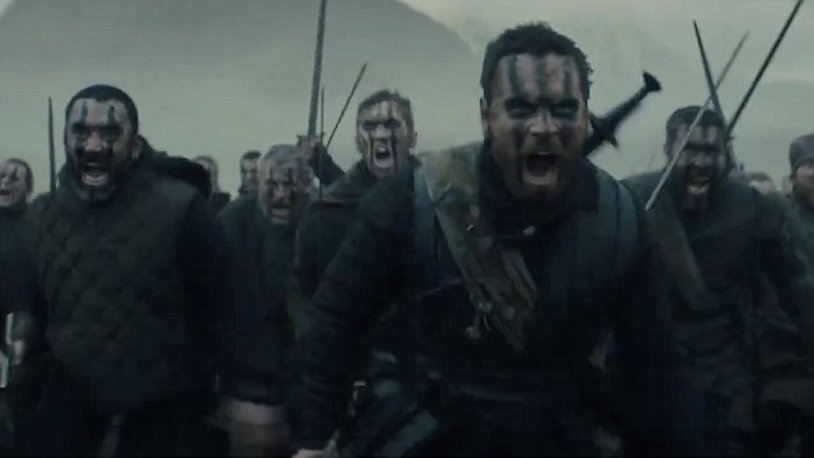Any adaptation of a play, consciously or not, will adopt a theatrical aesthetic. The performers exaggerate, the action constricts to a few locations. Theatre is also flexible. With runs that can last for months, every day is different and subject to a varying degree of improvisation and fluidity. So if film adaptations are subject to that kind of looseness, why shouldn't an audience member's experience be?
 Enter me, into the screening of Justin Kurzel's Macbeth. It's a late Friday morning, and I, as per usual, haven't eaten breakfast. I, also as per usual, am running on three hours of sleep. Great idea, I then presume, to take in 2+ hours of Shakespearean dialogue, drizzled with an accent famous for its ease of understanding: a Scottish brogue.
Enter me, into the screening of Justin Kurzel's Macbeth. It's a late Friday morning, and I, as per usual, haven't eaten breakfast. I, also as per usual, am running on three hours of sleep. Great idea, I then presume, to take in 2+ hours of Shakespearean dialogue, drizzled with an accent famous for its ease of understanding: a Scottish brogue.
I didn't catch a word.
Ay, here's a rub of theatre rearing its ugly head - how do you reach the guy in the back; the schmuck who wouldn't have seen your tale if not for his desire to come in out of the cold; the guy who's deaf in one ear and lost the other in Korea; the stupid, tired, hungry 22-year-old running on 75% brain power? The solution, my friends, is direction. The director treats each element of a work, the visuals, actors, music, screenwriting, and editing, like puzzle pieces. If they're good, each piece fits with the others so well, that even when a piece is missing, anyone will be able to make out what the picture is.
Macbeth is adeptly directed by Kurzel (The Snowtown Murders and next year's Assassin's Creed), blending epic landscapes with intimate soliloquies, eye-catching cinematography with nuanced performance. It's a beautiful movie about people who do ugly, sinful things, and Kurzel takes his time with the transformation, revealing how a simple spark can corrupt a good man.
(I can't believe I'm about to give a synopsis for a nearly 400-year-old story, but here we go.) Macbeth (Michael Fassbender) is the thane (think a governor who reports to a king) of Glamis, a province in Scotland. He serves as general of King Duncan's (David Thewlis) army, and after a successful battle, is visited by the Three Witches, who prophesy he will become the King of Scotland. As soon as Lady Macbeth (Marion Cotillard), his wife, become privy to this information, she becomes lustful of the potential for high status and power, planting the seed in Macbeth's mind to kill King Duncan and usurp the throne. Macbeth succeeds, and after gaining the throne, devolves into madness, paranoia, and overwhelming guilt, ready to kill anyone who crosses his path.
Much of my enjoyment and understanding comes from the actors, primarily the two leads. Fassbender and Cotillard each showcase a large range, while honestly, playing their roles down. Fassbender is an actor with such particular performances; he sells madness, not lunacy. He goes just the right amount in whatever emotional direction he's given that I feel this man as the character, not the actor approaching the role. He's intimidating, ferocious, unhinged, tragic, and frail. On the opposite spectrum, Cotillard's Lady Macbeth is subdued, the serpent whispering in Macbeth's ear, the one who reins him back in from his more manic episodes. However, for a woman who could be played just as a heartless monster, Cotillard portrays her with grace and surprising humanity.
This couple could, so easily, be over-the-top Bond villains. I admit my bias; this is the first time I'm introduced to these characters, so I include no other interpretations or general consensus on how these roles are usually played, but Kurzel locks these actors in their own heads for a fair portion of the film, as they question their ambitions and actions. As a result, we, the audience, have an easier time empathizing. It makes the evil they commit more terrifying, because if they're regular people, like us, how easy could it be for any one of us to be corrupted as violently or quickly as they?
For some, Macbeth may be better on rental. I'm a huge fan of dialogue, the way it looks, sounds, and reads. While the Scottish brogue gives the story a lyrical, musical quality, a conversational nature further separating its performers from theatre's exaggerated traditions, some may find they like it better when they can catch all the details reading the subtitles. I understand and appreciate that decision entirely, but there really is nothing like seeing this in the cinema, with the massive screen and floor-to-ceiling sound. The monologues can drag a bit, but when the film turns it up to 10, you see it, you hear it, you feel it in your bones. The puzzle's always visible; give this film a shot.
Thank you all for reading; I'm the Man Without a Plan, signing off.
Author's note: After two years, a lot of movies, and a lot of hours spent staring at my computer screen waiting for inspiration like lightning, my next post will be the Man Without a Plan's 100th. It's insane to think that I've done so many of these reviews, and am continuing to do so, but for a guy perpetually clueless as to what I should be doing, I figure I should give some insight as to what's next. I'm pretty damn sure this won't be a surprise, but I might as well just spit it out. Next time, on The Man Without a Plan, Star Wars: The Force Awakens. Biggest highlight of my blog should equal the biggest movie of the year, right?

No comments:
Post a Comment